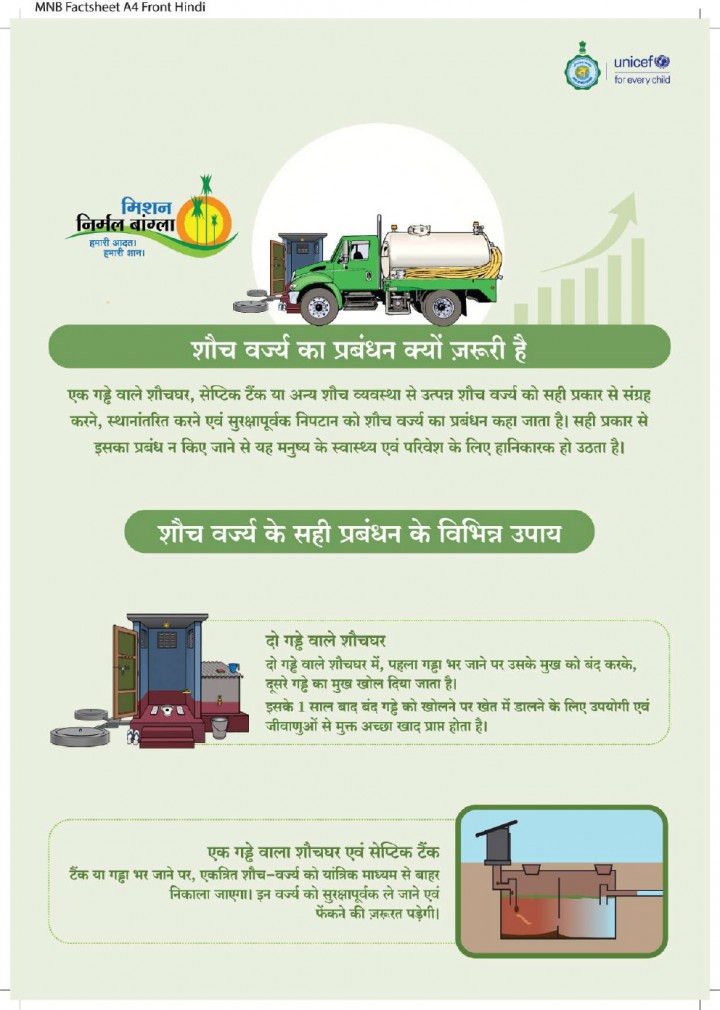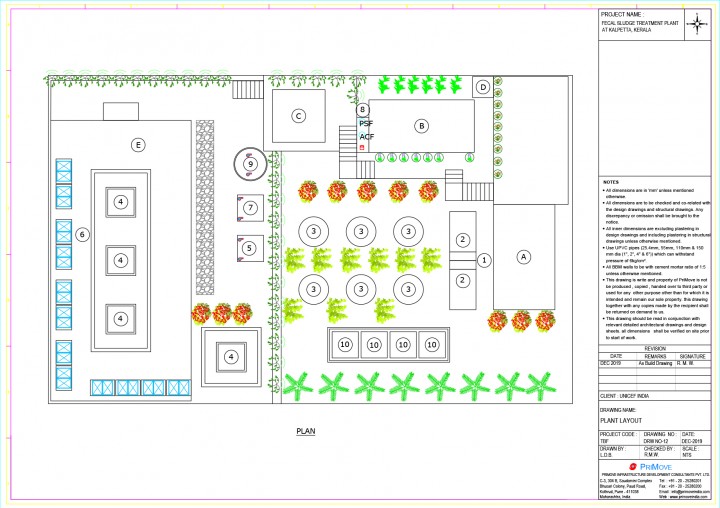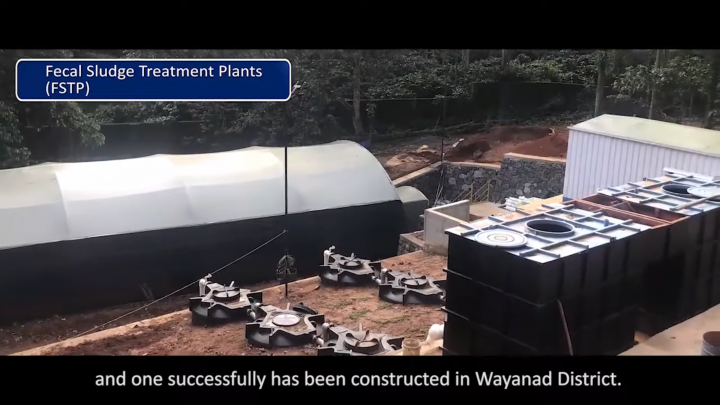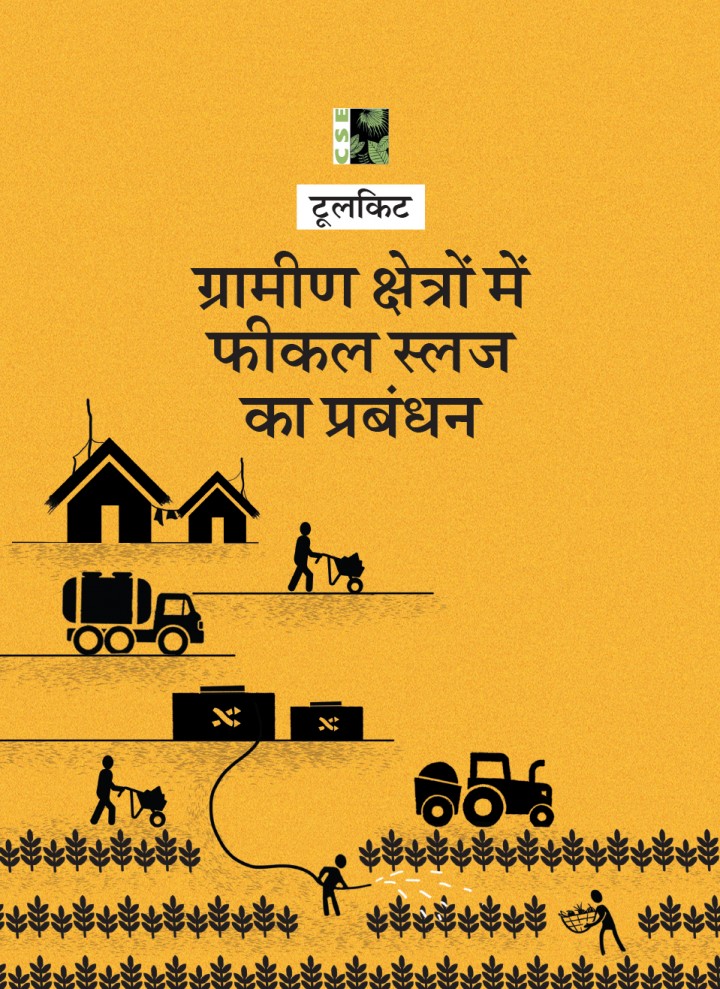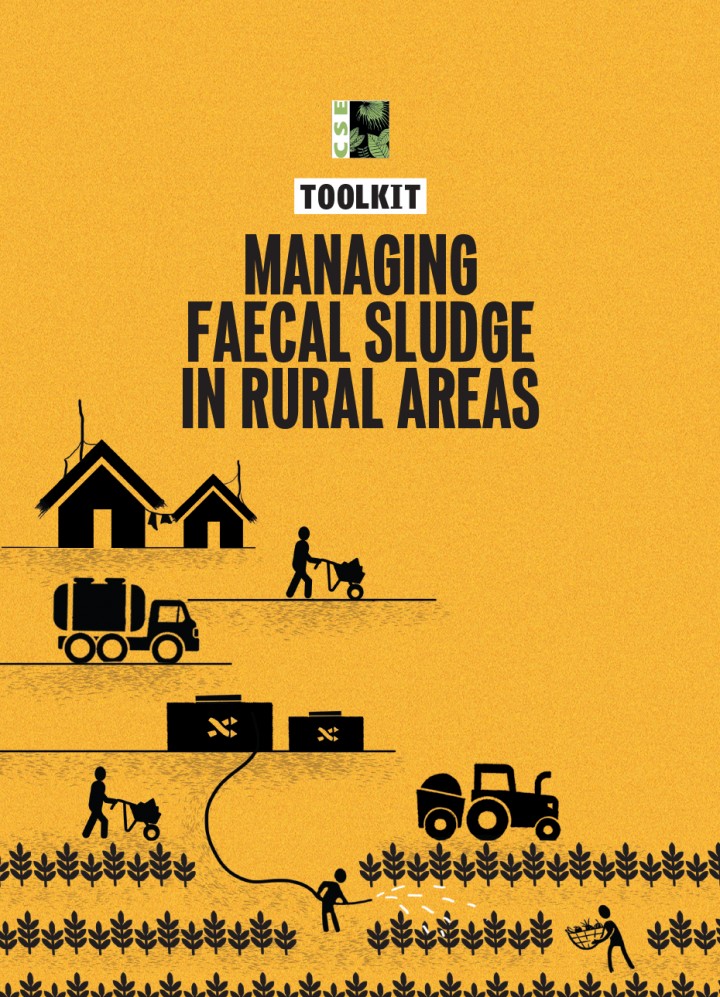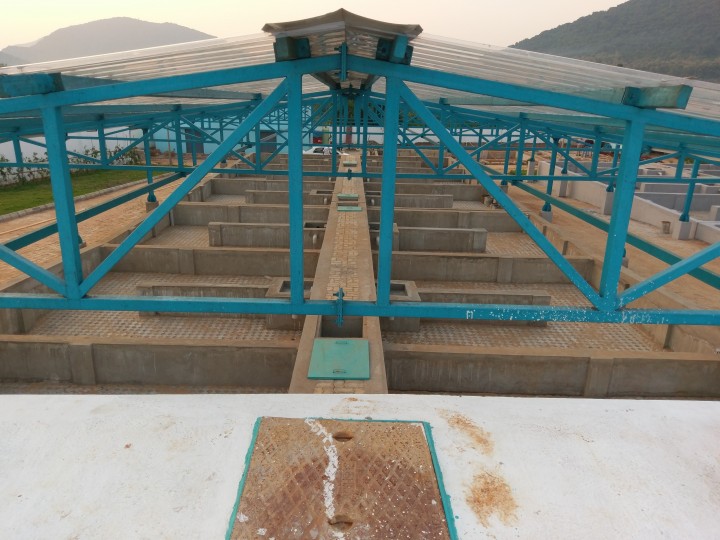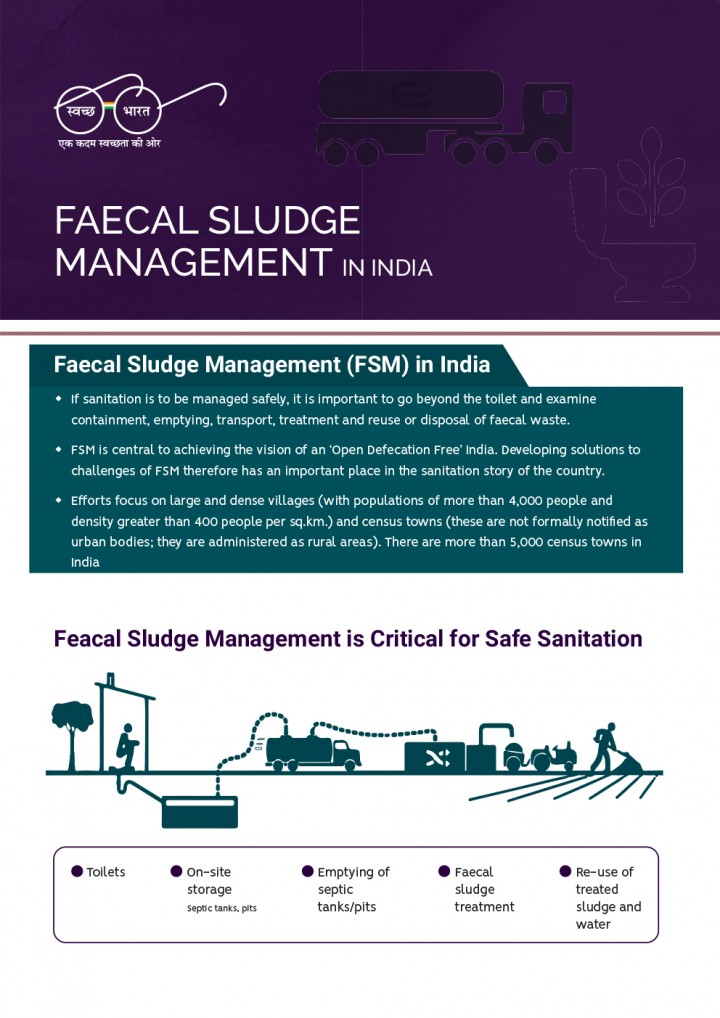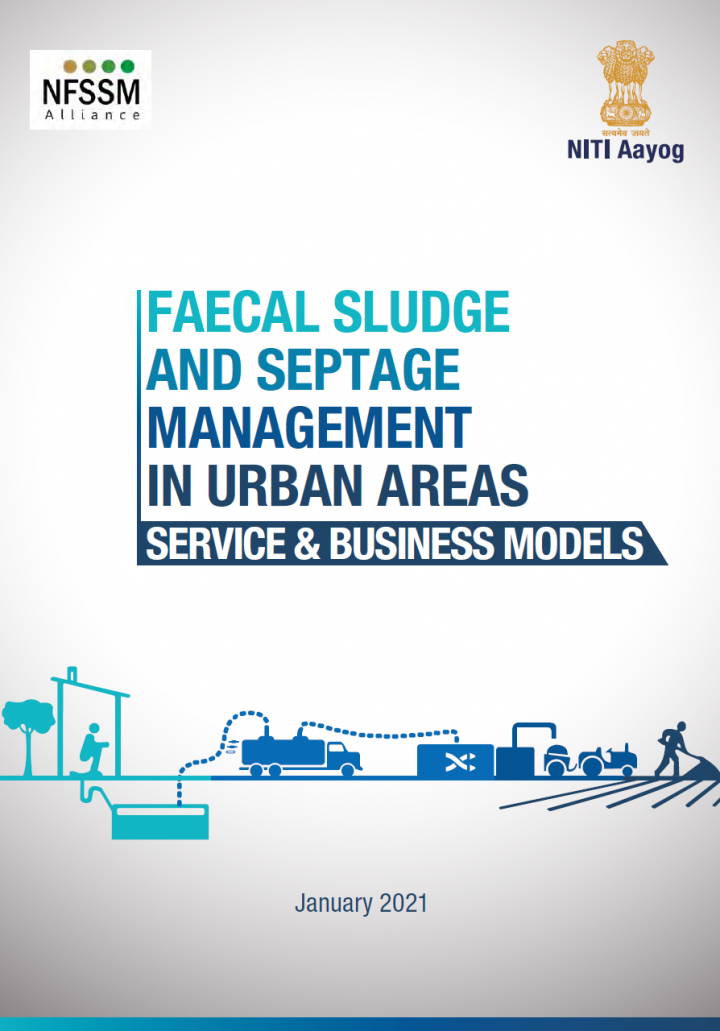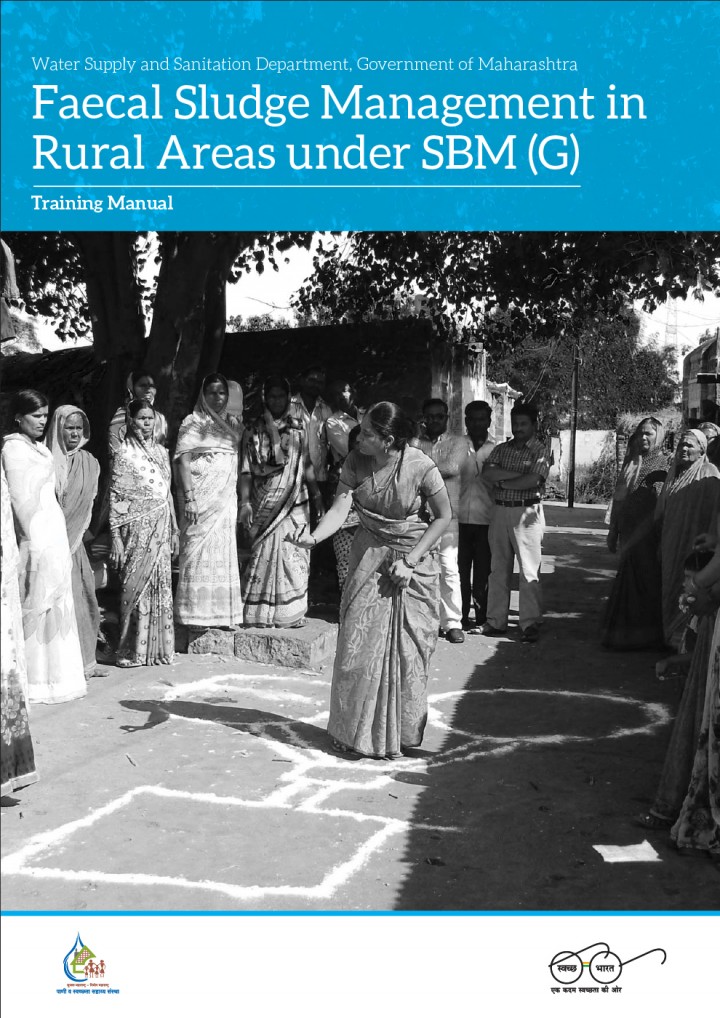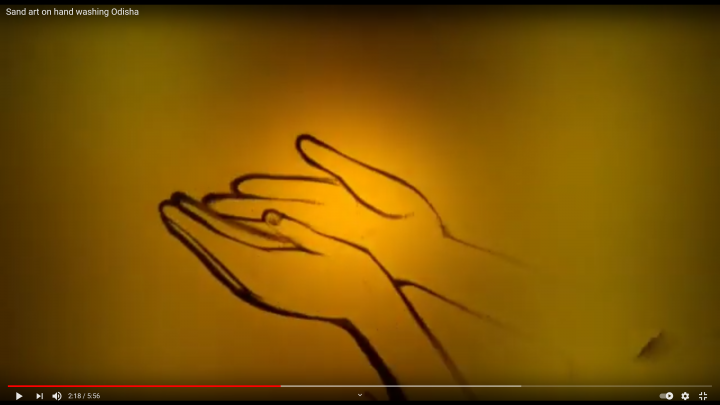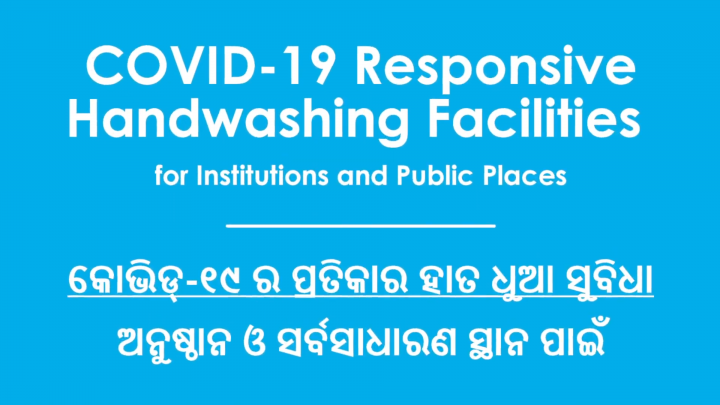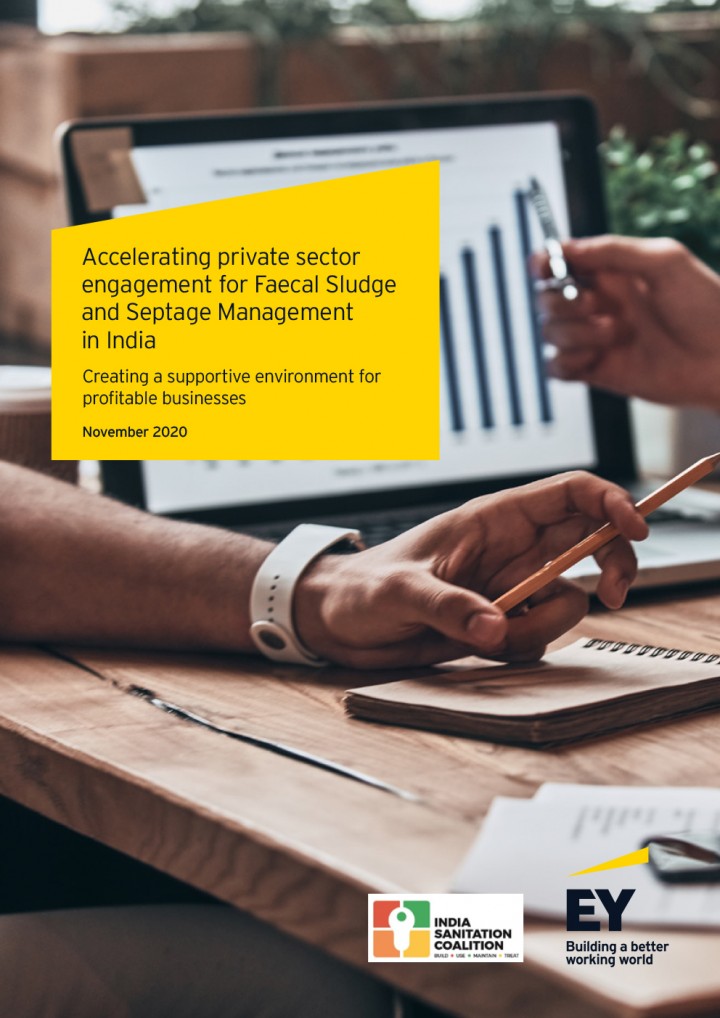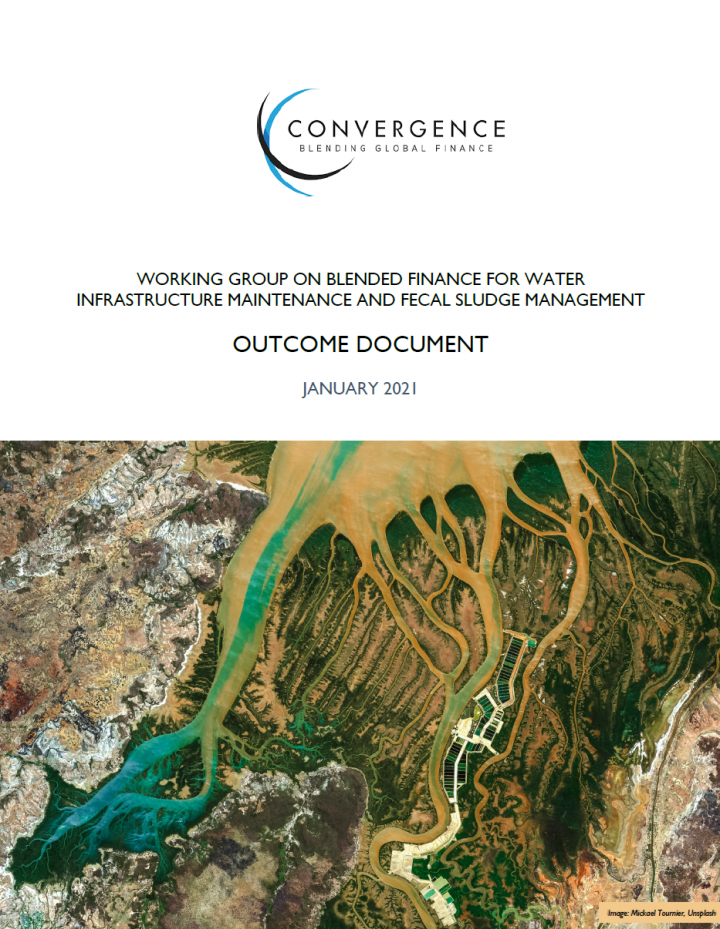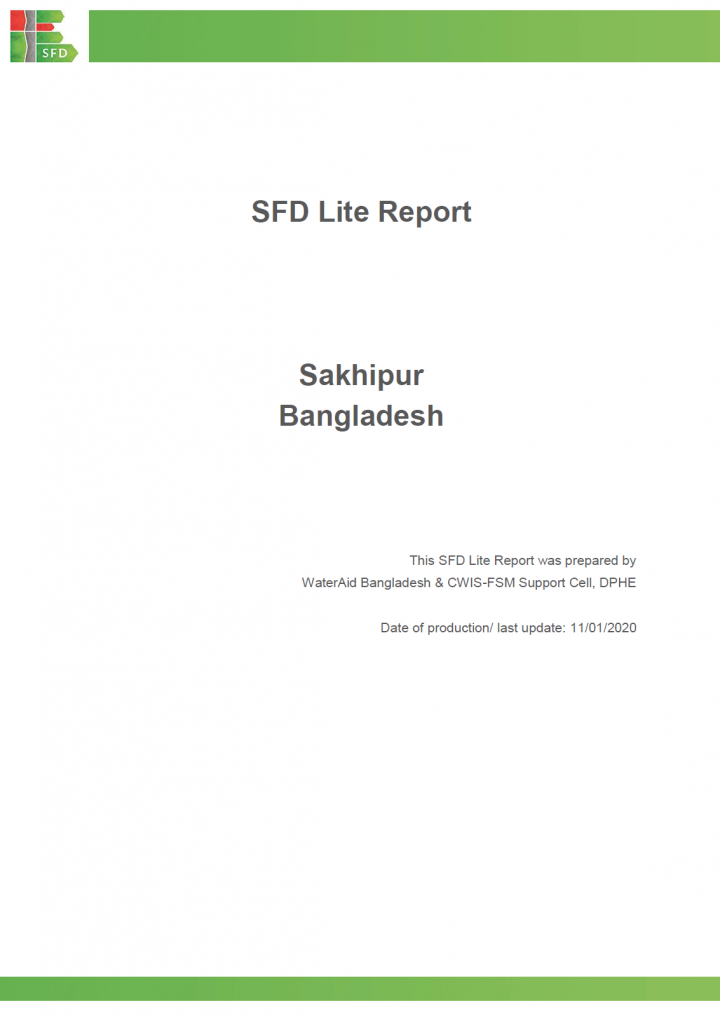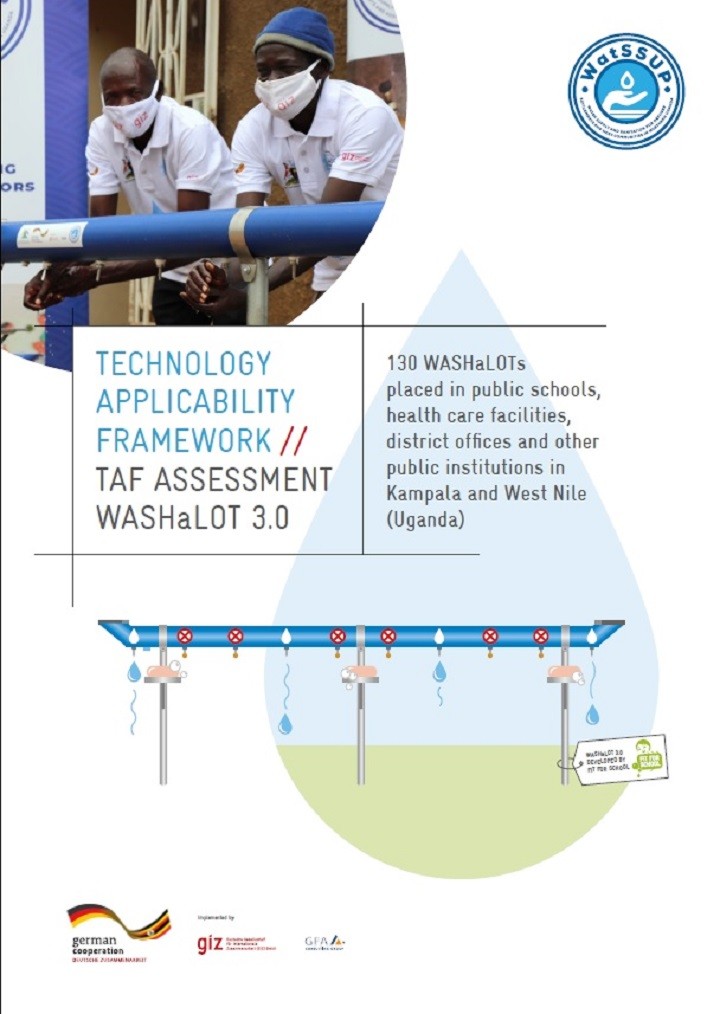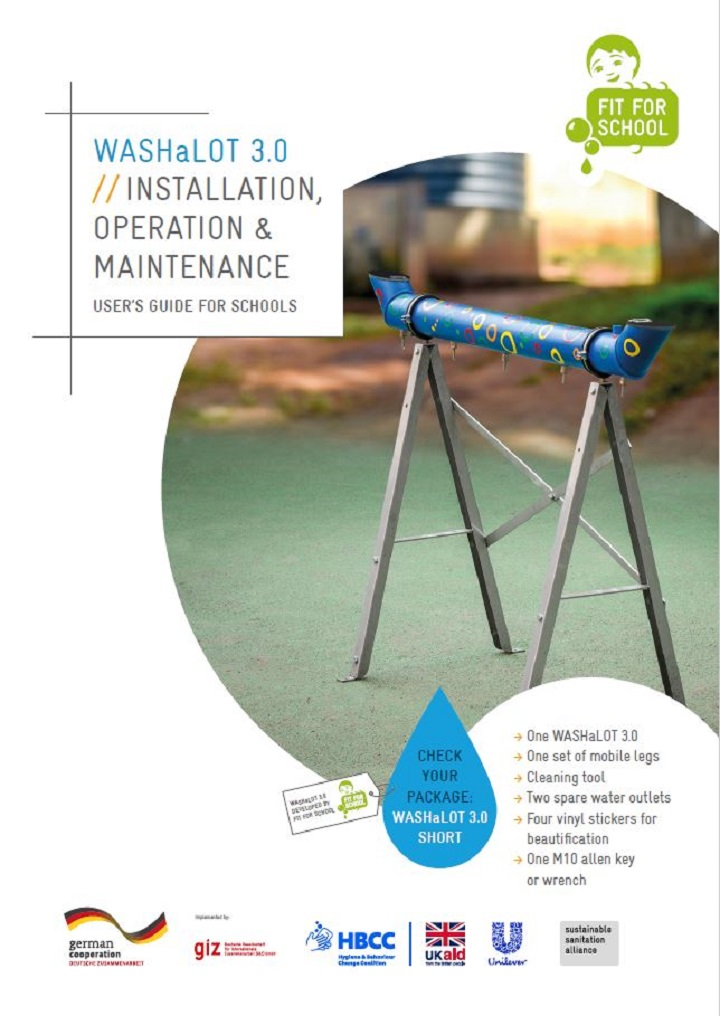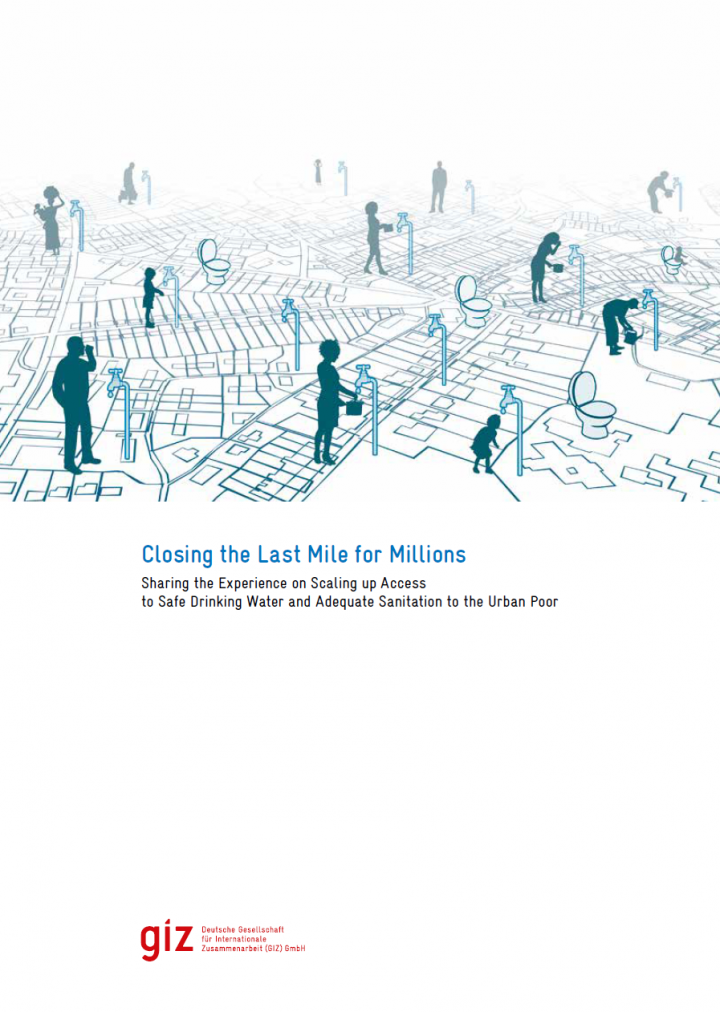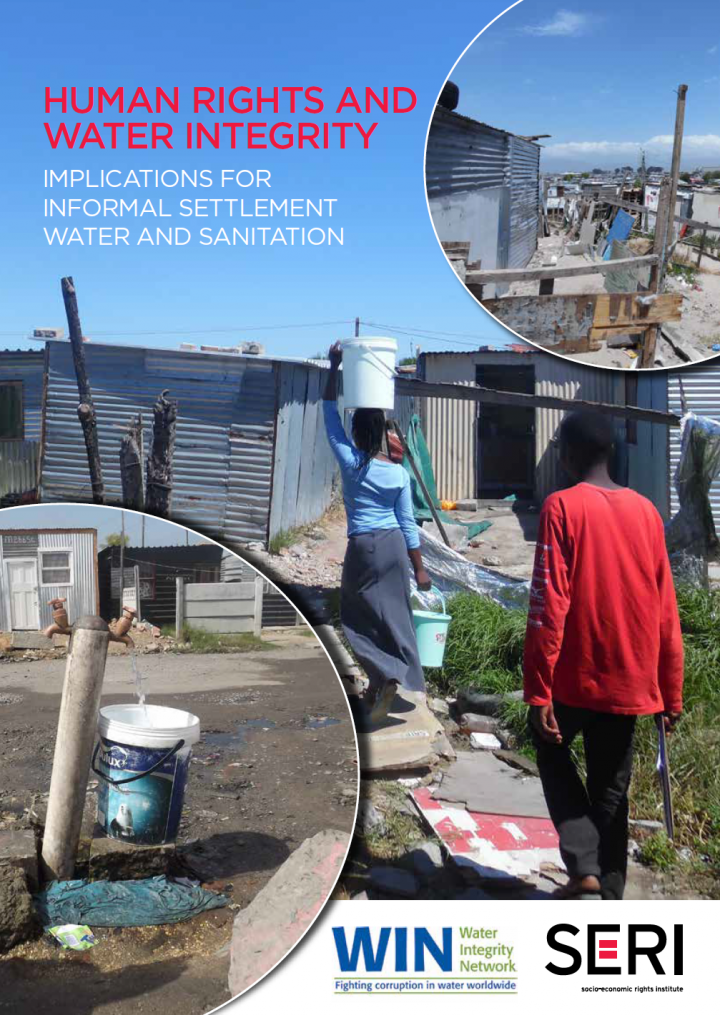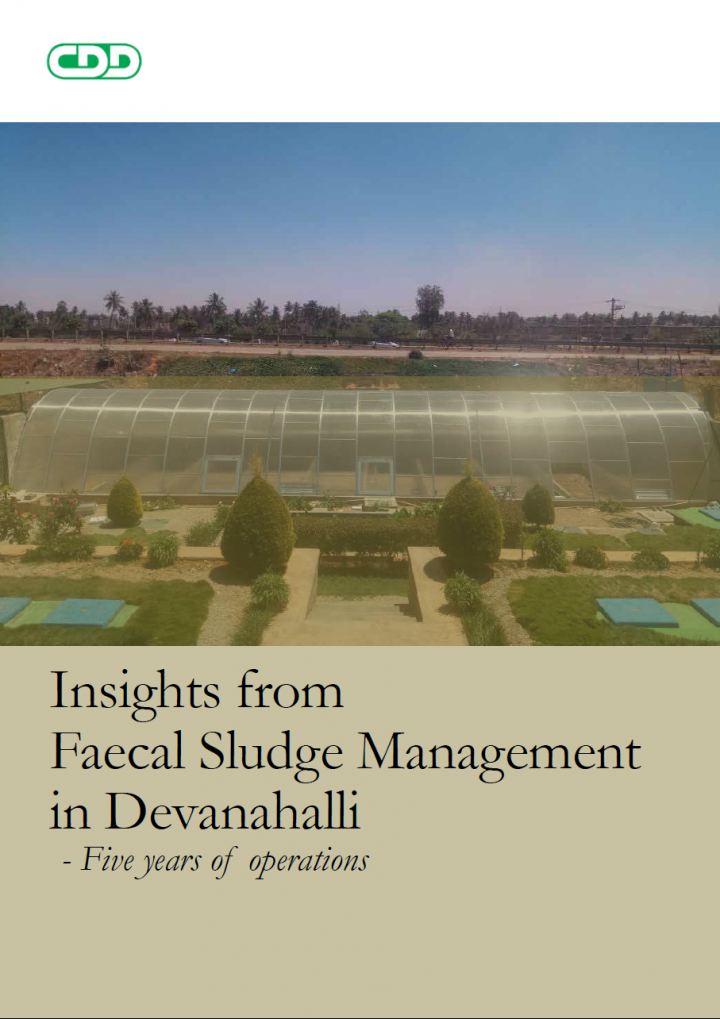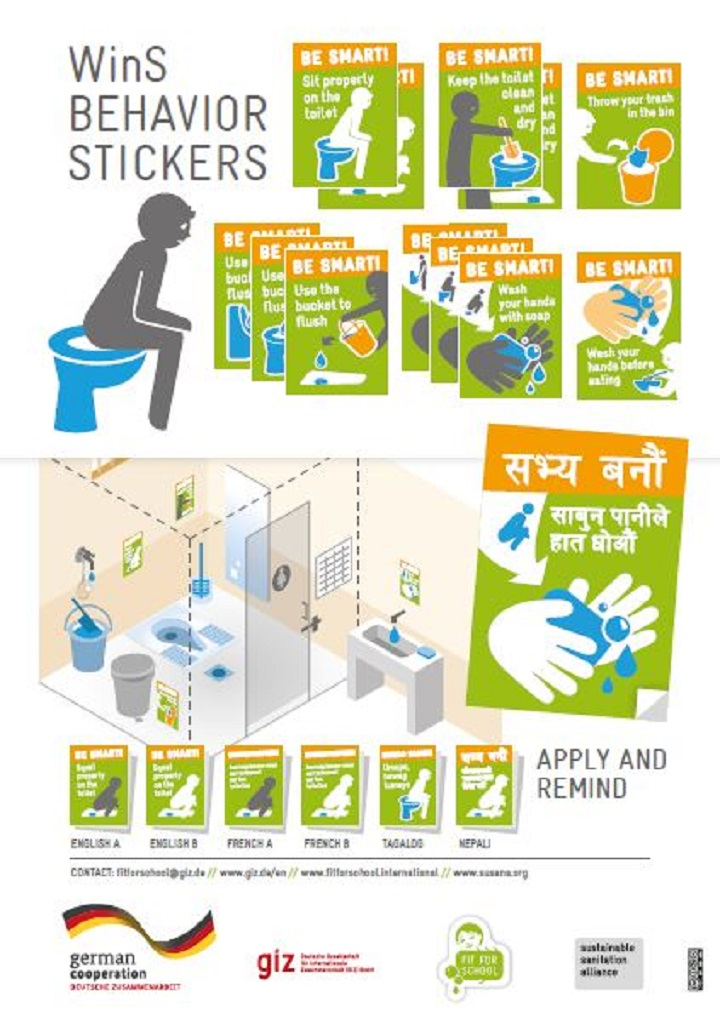Government of West Bengal and UNICEF (2020) FSM - Its Need, Process, and Roles of Village Institutions
West Bengal has developed a poster that depicts the techniques involved in managing faecal waste and lists the roles and responsibilities of village functionaries in adopting and promoting FSM in the second phase of the Swachh Bharat Mission. In Hindi, this two-page poster provides an overview for the public on FSM.
Primove Infrastructure Development Consultants (2020) Technical drawings of the Wayanad FSTP in India
This is a set of technical drawings for a FSTP built at Wayanad, Kerala. It will be useful for designers of FSTPs for small and medium towns. The schematics are provided in metric units. It has top views, hydraulic flows, unloading platform, screen chamber details, anaerobic digester, intermediate storage tank, drying beds, tiger bio-filters and the overall plan.
TBF Environmental Consultants and UNICEF (2019) Using Vermifiltration for Faecal Sludge Management
The Government of Kerala became open defecation free in 2016, allowing it to tackle the next challenge on the sanitation cycle - Faecal Sludge management. With funding support and supervision from UNICEF, and technical implementation by PriMove and TBF Environmental Solutions, Wayanad district constructed a Faecal Sludge Treatment Plant (FSTP) that uses earthworms to filter through the waste and produce safe compost and […]
Sengupta, S., and Anand, S. (2020) Toolkit for Managing Faecal Sludge in Rural Areas (in Hindi)
Faecal sludge management is essential to consolidate the gains from Swachh Bharat Mission. This is a toolkit in Hindi for practitioners for FSM in rural India. This toolkit in Hindi is a useful toolkit for managing faecal sludge in rural areas. It fills a gap in know-how and is of use to planners and practitioners to improve the management of faecal sludge in rural areas. […]
Verma, R., Sengupta, S., and Anand, S. (2020) Toolkit for Managing Faecal Sludge in Rural Areas
This toolkit (in English) is intended for practitioners and designers of faecal sludge management systems. It is a useful toolkit for managing faecal sludge in rural areas. It fills a gap in know-how and is of use to planners and practitioners to improve the management of faecal sludge in rural areas. While written with India in mind, it can be used in other developing countries. A […]
UNICEF India (WASH) (2020) FSM, A Priority for Improving Quality of Health and Water Sources Faecal sludge management is essential to consolidate the gains from Swachh Bharat Mission
The Swachh Bharat Mission (SBM), the flagship sanitation scheme of the Government of India has revolutionized India’s sanitation landscape. However, there are still gaps which need to be bridged to sustain and build upon the success realized. This article by the UNICEF India water, sanitation and hygiene (WASH) team highlights why faecal sludge management is the next practical step to keeping India safe and clean.
Ministry of Drinking Water and Sanitation (2021) Faecal sludge management in India A quick take on FSM policies and practice
This leaflet in English presents a summary of the national policies and some initiatives to manage faecal sludge from around the country. It ends with suggestions for managing faecal sludge covering technology, community engagement and tariffs.
NFSSM Alliance & Niti Aayog (2021) Faecal Sludge and Septage Management inUrban Areas Service & Business Models
The Faecal Sludge and Septage Management: Service Business Models shares leading practices and innovations to improve how faecal sludge is managed, and how to expand services to the millions of people living in thousands of cities in urban India, lacking access to safely managed sanitation.
(2018) Faecal Sludge Management in Rural Areas under SBM-G
UNICEF and the Water Supply and Sanitation Department of Maharashtra developed a manual to appraise government and village functionaries about the technical aspects, legal provisions, service value chain of FSM, relevant technologies of containment, collection, transportation and methodology for planning, implementation and monitoring of FSM projects.
(2020) Sand art on handwashing to prevent COVID-19 Sand Art video on Hand washing: Hand-washing with soap remains the first line of defense in preventing the spread of Coronavirus
This short video promotes handwashing with soap using sand art as the medium. The commentary is in Odiya.
UNICEF (2020) Handwashing options to combat COVID A compilation of handwashing options
Handwashing with soap is critical in the fight against COVID-19. This film is compilation of different design options for minimal touch hand wash facilities located in Odiya.
Ernst and Young India and India Sanitation Coalition (2020) Accelerating private sector engagement for Faecal Sludge and Septage Management in India Creating a supportive environment for profitable businesses
This report explores ways by which private sector engagement in FSSM can be successfully accelerated by looking at potential business opportunities and challenges in FSSM, lessons that can be learned from current FSSM practice and finally, key takeaways for the key stakeholders in the ecosystem. While each of these segments touch upon separate aspects of the FSSM ecosystem, the common thread of how private […]
Convergence © (2021) Working Group on Blended Finance For Water Infrastructure Maintenance And Fecal Sludge Management Outcome Document
Over the course of three months, a Working Group comprised of over 50 organizations explored the use of blended finance in two important segments of water service delivery and sanitation: (1) repair and maintenance of water infrastructure in less densely populated areas; and (2) fecal sludge management. Commissioned by the Swedish International Development Cooperation Agency (Sida), this Outcome Document highlights the Working Group's recommendations. Currently, there […]
WaterAid Bangladesh & CWIS-FSM Support Cell, DPHE (2020) SFD Lite Report - Sakhipur, Bangladesh
Sakhipur, recognized as municipality, is a town of Sakhipur Upazila which is located about 39 km by road from Tangail and 77 km northwest of Dhaka city, the capital of Bangladesh. Sakhipur became a Pourashava (municipality) in October 2000. It has an annual income of 6 million Bangladeshi Taka (BDT) over the last three years which makes it an ‘A’ category Pourashava. Sakhipur municipality consists […]
Srinivasan, S., Faithful, A. (2021) Technology Applicability Framework // Taf Assessment Washalot 3.0
130 WASHaLOTs placed in public schools, health care facilities, district offices and other public institutions in Kampala and West Nile (Uganda). In a participatory process, a technology implemented as a pilot is assessed through the perspective of three key stakeholder groups engaged with the implementation of the technology: user/buyer, producer/provider and regulator/ investor/facilitator. The three key stakeholder groups assess the six sustainability dimensions individually, resulting in […]
Madrid, F., Monse, B., Schlenk, J. (2021) WASHaLOT 3.0: User's Guide for Schools Installation, Operation and Maintenance
The WASHaLOT 3.0 is a low-cost and water-saving washing facility. For pandemic preparedness and response, the WASHaLOT 3.0 can be easily adjusted so that fewer water outlets are in use to ensure physical distancing. This user guide is produced to provide receiving schools with orientation on the WASHaLOT installation, guidance on operation & maintenance as well as recommendations for pandemic adjustments. The school community needs to be […]
Blume, S., Nordmann, D., Schäfer, D., Werchota, R. (2015) Closing the Last Mile for Millions Sharing the Experience on Scaling up Access to Safe Drinking Water and Adequate Sanitation to the Urban Poor
Despite concerted efforts to extend water and sanitation services to the fast-growing numbers of people living in urban low-income and often informal areas, the water sector in many parts of Sub-Saharan Africa appears to be stagnating. Many challenges stand in the way of closing the last mile of physical access for an estimated 250 million unserved urban residents. A misguided focus on conventional household connections […]
Roaf, V., Potter, A., Ngunjiri, I., and Schreiner, B. (2020) Human Rights and Water Integrity Implications For Informal Settlement Water And Sanitation
Despite clear international law on the human right to water, and widespread recognition of this right, almost one billion people still do not have adequate, affordable and safe access to water and 2.4 billion people do not have access to safe sanitation. The world’s urban population is increasing and by conservative estimates, rates of growth will continue well into the middle of this century. By 2050, […]
CDD Society (2020) Insights from Faecal Sludge Management in Devanahalli Five years of operations
The central questions that this thematic note seeks to address include: What can municipalities learn about creating a conducive enabling environment for faecal sludge management (FSM)? How can engineers create Faecal sludge treatment plant (FSTP) designs that work well on the ground both technically and financially? The Swachh Bharat Mission (SBM) has made significant strides in addressing the need for toilet infrastructure in India. To realize […]
GIZ (2020) WinS Behavior Stickers Apply and Remind
Behavior stickers for WASH in schools (WinS) interventions to be used for applying and reminding users of hygienic habits.
